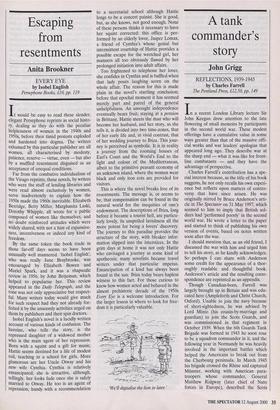Escaping from resentments
Anita Brookner
EVERY EYE by Isobel English Persephone Books, £10, pp. 119 It would be easy to read these slender, elegant Persephone reprints as social histo- ry, dealing as they do with the peculiar helplessness of women in the 1940s and 1950s, before their timid protests exploded and hardened into dogma. The writers exhumed by this particular publisher are all women, all characterised by modesty, patience, reserve — virtue, even — but also by a muffled resentment disguised as an acceptance of unequal conditions.
Far from the combative individualism of the Virago reprints, these novels, by writers who were the stuff of lending libraries and were read almost exclusively by women, serve inadvertently to explain how the 1950s made the 1960s inevitable. Elizabeth Berridge, Betty Miller, Marghanita Laski, Dorothy Whipple, all wrote for a public composed of women like themselves, and no doubt reinforced attitudes which were Widely shared, with not a hint of expansive- ness, inventiveness or indeed any kind of freedom.
By the same token the book trade in those far-off days seems to have been unusually well mannered. 'Isobel English', who was really June Braybrooke, was encouraged by Elizabeth Bowen and Muriel Spark, and it was a rhapsodic review in 1956, by John Betjeman, which helped to popularise her. This review appeared in the Daily Telegraph, and the tone was not only appreciative but respect- ful. Many writers today would give much for such respect had they not already for- feited it by the unseemly activities urged on them by publishers and their spin doctors. Isobel English's novel is a lucidly written account of various kinds of confusion. The heroine, who tells the story, is the repressed daughter of a widowed mother who is the main agent of her repression. Born with a squint and a gift for music, Hattie seems destined for a life of modest toil, teaching in a school for girls. More glamorous are her Uncle Otway and his new wife Cynthia. Cynthia is relatively emancipated; she is attractive, although, tellingly, her looks fade once she is safely married to Otway. He too is an agent of repression, handy with a recommendation to a secretarial school although Hattie longs to be a concert painist. She is good, but, as she knows, not good enough. None of these persons thinks it necessary to have her squint corrected: this office is per- formed by an elderly lover, Jasper Lomax, a friend of Cynthia's whose genial but intermittent courtship of Hattie provides a possible escape for the wretched girl, her manners all too obviously flawed by her prolonged initiation into adult affairs.
Too frightened to telephone her lover, she confides in Cynthia and is baffled when that lady pours laughing scorn on the whole affair. The reason for this is made plain in the novel's startling conclusion; before that epochal moment it has seemed merely part and parcel of the general unhelpfulness. An unsought independence eventually bears fruit; staying at a pension in Brittany, Hattie meets the man who will become her husband, and her story, as she tells it, is divided into two time-zones, that of her early life and, in vivid contrast, that of her wedding journey to Ibiza. This jour- ney is perceived as symbolic. It is in reality a journey from the rooming houses of Earl's Court and the World's End to the light and colour of the Mediterranean, albeit to the primitive peasant economy of an unknown island, where the women wear black and only iron cots are provided for visitors.
This is where the novel breaks free of its resentments. The message is, or seems to be, that compensation can be found in the natural world for the inequities of one's endowment. The descriptions of Ibiza, long before it became a tourist hell, are particu- larly lovely, its unspoiled lavishness all the more potent for being a lovers' discovery. The journey to this paradise provides the structure of the story, with bleaker infor- mation slipped into the interstices. In the grim days at home it was not only Hattie who envisaged a journey as some kind of apotheosis; many novelists became travel writers under that particular impetus. Emancipation of a kind has always been found in the sun: Ibiza today bears hapless witness to this fact. For those curious to know how women acted and behaved in the almost prehistoric decade of the 1950s Every Eye is a welcome introduction. For the larger lesson in where to look for free- dom it is particularly valuable.
'We'll digitalise the lion in later.'


























































 Previous page
Previous page